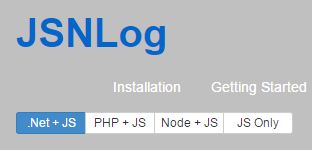
Before we go farther, I want to talk about the logging and use the logging framework for both the frontend and backend.
We will us NLog and JSNLog to fulfill the purpose.
We will install the following packages thru Nuget
And install the JSNLog js files by NPM.
npm intall jsnlog --save
<head>
<!-- ... -->
<script src="~/lib-npm/jsnlog/jsnlog.min.js"></script>
</head>
{
"dependencies": {
"Microsoft.NETCore.App": {
"version": "1.0.0",
"type": "platform"
},
"Microsoft.AspNetCore.Diagnostics": "1.0.0",
"Microsoft.AspNetCore.Server.IISIntegration": "1.0.0",
"Microsoft.AspNetCore.Server.Kestrel": "1.0.0",
"Microsoft.Extensions.Logging": "1.0.0",
"Microsoft.Extensions.Logging.Console": "1.0.0",
"Microsoft.Extensions.Logging.Debug": "1.0.0",
"Microsoft.Extensions.Logging.Filter": "1.0.0",
"Microsoft.AspNetCore.Mvc": "1.0.0",
"Microsoft.AspNetCore.StaticFiles": "1.0.0",
"Microsoft.AspNet.StaticFiles": "1.0.0-rc1-final",
"es6-shim.TypeScript.DefinitelyTyped": "0.8.1",
"NLog.Extensions.Logging": "1.0.0-rtm-alpha4",
"System.Data.SqlClient": "4.1.0",
"JSNLog.AspNetCore": "2.20.0",
"Newtonsoft.Json": "9.0.1"
},
"tools": {
"Microsoft.AspNetCore.Server.IISIntegration.Tools": "1.0.0-preview2-final"
}
//....
}
We have to update NLog settings in NLog.config.
Copy the following content to your NLog.config, and modify the file pathes, database connection string, targets and rules.
<?xml version="1.0" encoding="utf-8" ?>
<nlog xmlns="http://www.nlog-project.org/schemas/NLog.xsd"
xmlns:xsi="http://www.w3.org/2001/XMLSchema-instance"
xsi:schemaLocation="http://www.nlog-project.org/schemas/NLog.xsd NLog.xsd"
autoReload="true"
throwExceptions="true"
internalLogLevel="Error" internalLogFile="c:\temp\nlog-internal.log" >
<!—LOG format-->
<variable name="Layout" value="${longdate} | ${level:uppercase=true} | ${logger} | ${message} ${newline}"/>
<variable name="LayoutFatal" value="${longdate} | ${level:uppercase=true} | ${logger} | ${message} | ${exception:format=tostring} ${newline}"/>
<variable name="LayoutEvent" value="${date}: ${message} ${stacktrace}"/>
<!—LOG path -->
<variable name="LogTxtLocation" value="${basedir}/App_Data/Logs/${shortdate}/${logger}.log"/>
<variable name="LogTxtLocationFatal" value="${basedir}/App_Data/Logs/${shortdate}/FatalFile.log"/>
<variable name="ProjectName" value="Angular.Mvc"/>
<targets>
<!—Text file-->
<target name="File" xsi:type="File" fileName="${LogTxtLocation}" layout="${Layout}" />
<target name="FileFatal" xsi:type="File" fileName="${LogTxtLocationFatal}" layout="${LayoutFatal}"/>
<!—Event log-->
<!--<target name="Event" xsi:type="EventLog" source="${ProjectName}" log="Application" layout="${LayoutEvent}" />-->
<!—Log Viewer(Optional)-->
<target name="LogViewer" xsi:type="NLogViewer" address="udp://127.0.0.1:3333"/>
<!--Database-->
<target name="LogDatabase" xsi:type="Database" >
<connectionString>
Data Source=Your-DB-Server-name;Initial Catalog=Your-DB-Name;Integrated Security=True;
</connectionString>
<commandText>
INSERT INTO AspnetCoreLog (
Application, Logged, Level, Message,
Logger, CallSite, Exception
) values (
@Application, @Logged, @Level, @Message,
@Logger, @Callsite, @Exception
);
</commandText>
<parameter name="@application" layout="AspNetCoreNlog" />
<parameter name="@logged" layout="${date}" />
<parameter name="@level" layout="${level}" />
<parameter name="@message" layout="${message}" />
<parameter name="@logger" layout="${logger}" />
<parameter name="@callSite" layout="${callsite:filename=true}" />
<parameter name="@exception" layout="${exception:tostring}" />
</target>
</targets>
<rules>
<logger name="*" levels="Trace, Debug, Info, Warn" writeTo="File" />
<logger name="*" levels="Error, Fatal" writeTo="FileFatal,LogDatabase" />
<logger name="*" levels="Trace, Debug, Info, Warn, Error, Fatal" writeTo="LogViewer" />
</rules>
</nlog>
Don’t forget to create the logging table in your database.
CREATE TABLE [dbo].[AspnetCoreLog] (
[Id] [int] IDENTITY(1,1) NOT NULL,
[Application] [nvarchar](50) NOT NULL,
[Logged] [datetime] NOT NULL,
[Level] [nvarchar](50) NOT NULL,
[Message] [nvarchar](max) NOT NULL,
[Logger] [nvarchar](250) NULL,
[Callsite] [nvarchar](max) NULL,
[Exception] [nvarchar](max) NULL,
CONSTRAINT [PK_dbo.Log] PRIMARY KEY CLUSTERED ([Id] ASC)
WITH (PAD_INDEX = OFF, STATISTICS_NORECOMPUTE = OFF, IGNORE_DUP_KEY = OFF, ALLOW_ROW_LOCKS = ON, ALLOW_PAGE_LOCKS = ON) ON [PRIMARY]
) ON [PRIMARY]
Open Startup.cs and update the Configure function,
NLog to the Logger factoryjsnlog adapter to Logger factorypublic class Startup
{
public void ConfigureServices(IServiceCollection services)
{
services.AddMvc();
}
public void Configure(
IApplicationBuilder app,
IHostingEnvironment env,
ILoggerFactory loggerFactory)
{
#region NLog
//add NLog to ASP.NET Core
loggerFactory.WithFilter(new FilterLoggerSettings{
{ "Microsoft", LogLevel.Warning },
{ "System", LogLevel.None },
{ "Default", LogLevel.Debug }
}).AddNLog();
env.ConfigureNLog("NLog.config");
#endregion
#region JSNLog
// Configure JSNLog
// See jsnlog.com/Documentation/Configuration
var jsnlogConfiguration = new JsnlogConfiguration();
app.UseJSNLog(new LoggingAdapter(loggerFactory), jsnlogConfiguration);
#endregion
// …
}
}
}
//skip...
//jsnlog
gulp.task('copy-jsnlog', function () {
return gulp.src(root_path.nmSrc + "/jsnlog/jsnlog*.js", {
base: root_path.nmSrc + '/jsnlog/'
}).pipe(gulp.dest(root_path.package_lib + '/jsnlog/'));
});
gulp.task('copy-jsnlog-typing', function () {
return gulp.src(root_path.nmSrc + "/jsnlog/Definitions/jsnlog.d.ts", {
base: root_path.nmSrc + '/jsnlog/Definitions/'
}).pipe(gulp.dest(root_path.package_lib + '/typings/'));
});
gulp.task("copy-all", [
//...
"copy-jsnlog",
"copy-jsnlog-typing"
])
Run the task to copy them to $/wwwroot/lib-npm

public class BaseController: Controller
{
protected static Logger _logger = LogManager.GetCurrentClassLogger();
[Route("[action]")]
public IActionResult Index()
{
_logger.Debug($"Areas:Basic,Controller:Customer,Action:Index");
_logger.Error($"Areas:Basic,Controller:Customer,Action:Index");
return View();
}
}
Add the reference path to the jsnlog type definitions in the typescript for intelliSense.
/// <reference path="../../../lib-npm/typings/jsnlog.d.ts" />
And now we can log eveything in angular components.
JL("Angular2").debug("Saving a customer!");

